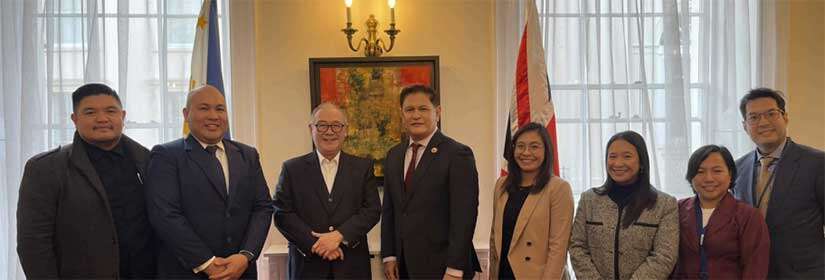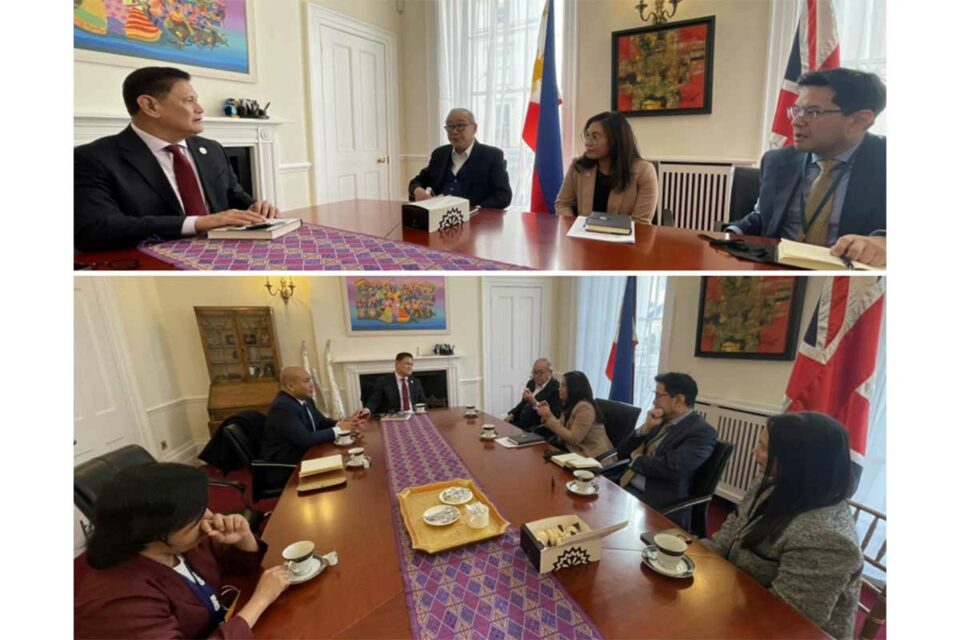Advocating for Filipino Fishers’ Rights: A Collaborative Effort
In a significant meeting at the Philippine Embassy in London, TUCP President and House Deputy Speaker Raymond Democrito C. Mendoza (TUCP Party-list) engaged with prominent figures including the Philippine Ambassador to the UK, Teodoro “Teddy Boy” Lopez Locsin Jr., Consul Raphael Hermoso from the International Maritime Organization (IMO), Maritime Attaché Atty. Sharon Aledo, and Sheila Mae Aguilar, Officer-in-Charge of OWWA London. The discussions also included contributions from TUCP’s Chief of Staff Archie Ranin and APSU’s National Vice President for Operations Atty. Generick Humprey Morales.
The Plight of Filipino Fishers in the UK
During this critical dialogue, issues surrounding london-taxi-powerhouse-addison-lee-rents-rise-as-home-prices-dip-in-exciting-market-shift/” title=”Singapore's ComfortDelGro Makes Bold Move by Acquiring London Taxi Powerhouse Addison Lee; Rents Rise as Home Prices Dip in Exciting Market Shift”>exploitation faced by Filipino fishers working on UK fishing vessels were front and center. Mendoza highlighted that despite their essential role as integral components of the UK’s fishing sector, these workers suffer severe neglect—often overworked, underpaid, and devoid of necessary labor protections.
“Our fellow Filipinos are essential to maintaining the UK’s fishing industry; however, they are treated as mere shadows—overburdened without proper compensation or rights,” Mendoza expressed emphatically.
The Statistics Behind Exploitation
A recent report from Financial Times revealed that more than 50% of migrants contributing to a workforce comprising around 11,000 fishers in the UK originate from abroad. For many years now, UK fishing companies have manipulated transit visas designed for merchant seafarers to circumvent domestic employment regulations.
Mendoza characterized this loophole as enabling “a systematic disregard for labor standards that reduces our fishers to nothing more than disposable resources.” He added that this facilitates harsh working conditions where wages dwindle while debts incurred through recruitment persist—a clear violation against ILO Convention 188.

Pushing for Legal Reforms
The TUCP has been an advocate for ratifying ILO Convention No. 188 both within Philippine territories and particularly concerning overseas operations during its tenure in Congress. In line with these efforts, House Resolution No. 2059 was reintroduced calling upon President Ferdinand “Bongbong” Marcos Jr.’s administration to act promptly in securing Senate approval for ratification.
“Countless Filipino fishers encounter extreme hardships abroad while struggling just to make ends meet,” warned Mendoza about their circumstances amid escalating global challenges such as human trafficking and forced labor prevailing within international waters.
A New Opportunity: Skilled Worker Visas
In response to ongoing concerns regarding migrant worker treatment within fisheries sectors; recently introduced Skilled Worker Visas allow foreign fisher personnel qualified status along with access rights like increased wages and improved living conditions—including family reunification options—marking progress towards equity.” However,” lamented Mendoza,”the associated financial burdens alongside an unaccommodating English proficiency requirement present notable hurdles preventing many potential beneficiaries from utilizing these new pathways.”
A Road Towards Fair Labor Practices
The TUCP advocates strongly for establishing a bilateral agreement between both nations aimed directly at standardizing work contracts ensuring equal protection irrespective of immigration status—which would significantly lower barriers related specifically toward visa applications making them user-friendly especially affordable while promoting fair hiring methodologies across all platforms involving overseas workers coming from Philippine backgrounds involved primarily around commercial fisheries globally.”
A Partnership Built on Dignity
Ambassador Locsin along with MWO representatives committed themselves notably towards partnering further with organizations such as TUCP & APSU while collaborating extensively utilizing support networks —including ITF portfolio managers—to actively address pressing issues confronting Filipinos employed domestically & aboard ships enforced under harsh operational conditions prevalent across various sectors collectively representing economic frameworks sustained via hard-working individuals risking safety so others may benefit accordingly!” summed up straightforwardly ümendoza.”


